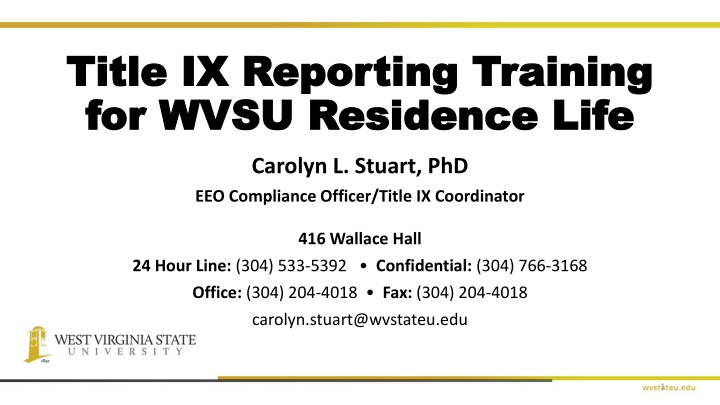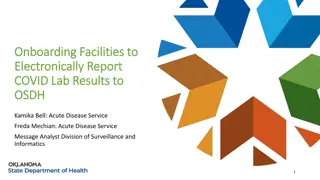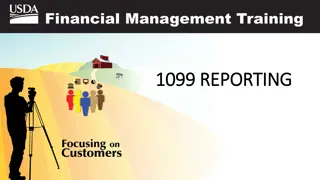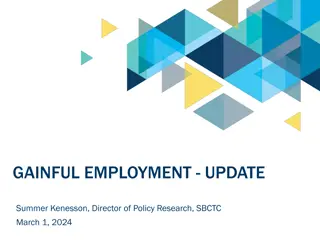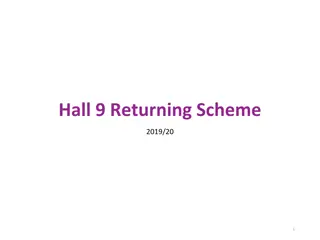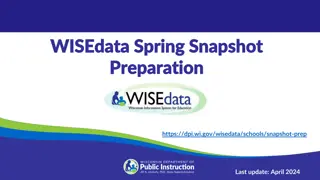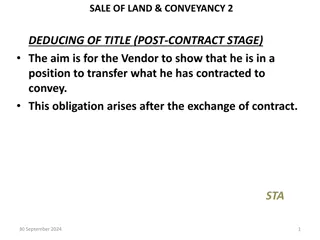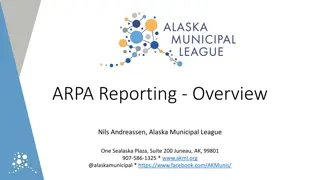Title IX Reporting Training for WVSU Residence Life
Comprehensive training on Title IX reporting including understanding Title IX, what should be reported, who to report to, and practical concerns. Covers the importance of reporting sexual misconduct incidents and guidance for Resident Assistants in supporting students effectively.
Uploaded on Aug 02, 2024 | 1 Views
Download Presentation

Please find below an Image/Link to download the presentation.
The content on the website is provided AS IS for your information and personal use only. It may not be sold, licensed, or shared on other websites without obtaining consent from the author.If you encounter any issues during the download, it is possible that the publisher has removed the file from their server.
You are allowed to download the files provided on this website for personal or commercial use, subject to the condition that they are used lawfully. All files are the property of their respective owners.
The content on the website is provided AS IS for your information and personal use only. It may not be sold, licensed, or shared on other websites without obtaining consent from the author.
E N D
Presentation Transcript
Title IX Reporting Training Title IX Reporting Training for WVSU Residence Life for WVSU Residence Life Carolyn L. Stuart, PhD EEO Compliance Officer/Title IX Coordinator 416 Wallace Hall 24 Hour Line: (304) 533-5392 Confidential: (304) 766-3168 Office: (304) 204-4018 Fax: (304) 204-4018 carolyn.stuart@wvstateu.edu 1
Training Objectives Brief overview of Title IX Resident Assistant (RA)/Resident Leader (RL) Reporting Consent Practical Concerns/ Q and A Student Support 2
What is Title IX? Title IX is a federal civil rights law that prohibits discrimination on the basis of sex with respect to schools that receive financial assistance from the U.S. Department of Education (US-DOE) Title IX applies to WVSU, as well as any other school that accepts federal financial assistance Title IX protects against sexual harassment in the educational environment, gender based harassment, inequitable funding in Athletics based on sex, sexual harassment in the workplace, sexual assault, dating/domestic violence, stalking, or any other discrimination or harassment based on sex Title IX is enforced by the US-DOE s Office for Civil Rights (OCR). A Final Rule was passed down on May 6, 2020 to implement by August 14, 2020. Any school covered by Title IX is required to have a Title IX Coordinator to ensure its compliance with Title IX Note: Title IX prohibits sexual violence as a form of sexual harassment 3
What Should be Reported? You should absolutely report anything that remotely resembles sexual misconduct It is the responsibility of the proper University Officials to determine if a particular set of facts equate to sexual violence, based on the investigation Examples of comments in which a report should be made: o I had sex on Saturday night that I wasn t 100 percent comfortable with. o I blacked out at a party and woke up naked next to someone I have never met before. I am not sure what happened or how I got there. o A person kept pressuring me to have sex last night and I eventually did although I didn t want to do so. NOTE: It is important to remember that in some instances a student may not say I was raped or sexually assaulted; they may instead describe a situation that they were uncomfortable with. As an RA just be mindful that students may not necessarily always use the buzz words . 4
Who Should I Report the Information to? If a student reports an incident of sexual violence to you, a report should be made to your Residence Life Director (RD) as quickly as possible. It can also be reported to any Official with Authority (OWA) You should provide any relevant details that you have (i.e., name of student(s) involved, location of incident, if physical violence was allegedly used, etc.) Once this information has been communicated, you have fulfilled your responsibility to report incidents of sexual violence Once the Title IX Coordinator (TIXC) receives the report, the appropriate University officials will be engaged to examine the report You are only expected to report what you have been told; you do not need to independently investigate, or otherwise attempt to resolve the complaint 5
When Should The Report Be Made? RAs/RLs should adhere to the specific reporting timeframe as given by RDs The Report should be made as soon as possible. The sooner the information is communicated, the swifter the action is that can be taken Lapses in report times can cause evidence to be lost/destroyed, memories to fade, and stall interim measures that may be put in place 6
Why Do I Have to Report? It is the right thing to do Required by Title IX Required by University Policy; WVSU BOG Policy 14 Required as part of job duties and as a Responsible Employee 7
What Happens If I Dont Report? A student could be subjected to an unsafe learning environment WVSU could be in noncompliance with Title IX (which could ultimately cost WVSU its federal funding from the US-DOE) WVSU could be subjected to major legal liability Possible employment sanctions Note: If a University employee does not report information of any type of possible sexual misconduct, and the student is under the age of 18, the University WILL face a fine of ONE MILLION DOLLARS PER OCCURANCE OF NON-REPORTING. 8
Practical Concerns Practical Concerns - - First Contact How do I speak to someone at 2am on a Saturday morning who may have been assaulted? First Contact Don t be judgmental! Listen closely and attentively. (Avoid Why questions) Protect the individual s privacy by not sharing the conversation with others Acknowledge how the individual is feeling and ask if there is anything that you can do for them in the immediacy Encourage the individual to preserve any evidence Explain you will need to inform a University official so that the Student can be protected Inform the Student of available resources 9
Practical Concerns The Student does not want the information reported, what do I do? According to WVSU BOG Policy 14, RAs/RLs are mandatory reporters, which means they are required to report any potential Title IX violations, even if it goes against a student s wishes As an RA/RL, you are often the closest potential reporters to residential students, so you have access to more information and trust. But you must tread lightly when it comes to reporting. Since you are mandated to report incidents, it is better for students to know that what they say is not confidential up front, but that it will be handled discreetly 10
Practical Concerns Can I tell the Student that the information is confidential? WVSU considers all RAs/RLs as mandatory reporters. If a student comes to you, it is best to let them know at the start of the conversation that you are a mandatory reporter and that you are required to report any incident of sexual misconduct If they would like to speak with someone confidentially, WVSU s on-campus confidential resources include the Counseling and Accessibility Services at 125 Sullivan Hall, East 11
What Happens After the Report is Received by the Title IX Coordinator? The Title IX Coordinator will contact the Student and inform them of their rights and will assist the Student in receiving help from the appropriate University resources If needed, the Title IX Coordinator will work in conjunction with the appropriate office (housing, academic affairs, etc.) to take interim measures when necessary. Such measures include but are not limited to: changes in housing arrangements, changes in course schedules, No Contact Order (NCO), interim suspension, changes in exam times, etc. 12
What Happens After the Report is Received by the Title IX Coordinator Cont d The Title IX Investigation begins; the extent of Investigation is determined by the Complainant s level of participation. The Investigation includes: Complainant and Respondent statements, witness interviews, review of police reports (if applicable), review of text messages, emails and video surveillance (if applicable), etc. You as the reporter may even be involved at some point I Investigation determines by the preponderance of the evidence whether there is or is not sufficient evidence of sexual misconduct Possible sanctions will be issued if there is sufficient evidence of sexual misconduct 13
Vignette I was at a party and a friend and I were talking most of the night. We ended up in his room where we started kissing. He wanted to have sex and I didn t. I told him no several times, but he continued to pursue. He kept trying for so long and I felt I couldn t get away. Finally, I just asked him to use a condom. Immediately after sex I left. I somewhat blame myself because I could have tried harder to fend him off. At the time I felt the easiest way out was just to let him continue. If I had shouted, someone would have helped, but because he was a mutual friend, I wanted to avoid a scene. 14
QUESTION/ANSWER QUESTION: I do not believe what the student is saying and thus I do not want to get anyone in trouble . In fact, I think the allegation is ridiculous. Do I still have to report? ANSWER: ABSOLUTELY! Regardless of what you think about the merits of an allegation you MUST report it to the Title IX Coordinator. It is the responsibility of appropriate University officials to determine the merits of allegations of sexual misconduct. Report the matter to the Title IX Coordinator and let the appropriate officials do their job. A subsequent investigation can assist in determining the merits of an allegation and whether a sanction is required. 15
QUESTION/ANSWER QUESTION: Sexual Assault is a crime. Shouldn t I report it to local police instead of the University? ANSWER: A report should be made to the TIXC. The TIXC will inform the student of their right to file a criminal complaint. It is important to note that the University is required to respond when it receives information about a possible sexual assault, while students have the option to file a police report and sometimes elect not to do so. 16
How to be Supportive Do: Communicate these points: I m sorry that this situation has happened |It is not your fault | You are not alone Be calm. If you are in crisis, the victim or survivor may feel the need to take care of you rather than themselves. Be aware of the importance of separating your own experiences and emotions from them Be informed. Learn about the services available on campus and in the community and be able to assist them in connecting to resources Listen. Being a good listener means being non-judgmental and non-blaming. Try not to be intrusive If they choose to report to law enforcement or the university, support them in those choices Understand that it is normal for the person to experience a wide range of emotions and reactions 17
How NOT to be Supportive Don't: Blame them Question their role in the situation Tell them what you would have done in that situation Tell them how to feel or how you think they should feel Tell them what to do, but rather inform them of the available resources 18
Still Unsure About What To Do? Email: carolyn.stuart@wvstateu.edu Call: 304-204-4018 304-533-5392 24 Hour Title IX Phone 19
KEYNECTUP Text WVSUSafe to 444-999 20
KEYNECTUP You should then receive a text like this. Click the link to download the details. 21
KEYNECTUP You will then be directed to this screen where you will need to enter your first and last name on the first line and your email address on the second line and click submit. 22
KEYNECTUP Next, choose student, faculty, or staff member in the text box and click send. 23
KEYNECTUP Click Download Card 24
KEYNECTUP Click Open in Contacts 25
KEYNECTUP You should then see this page. Click Save in the upper right corner. 26
KEYNECTUP Go to your contacts and look for your search bar menu. Type in a number of different terms related to Title IX, such as assault, and the WVSU Title IX & Safety contact card with all of the important contact information will appear. 27
STAY SAFE! Have a Great Semester! 28
